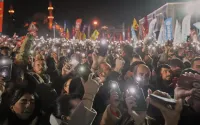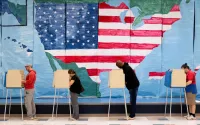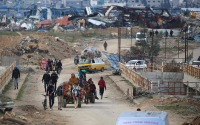Fighting spread across the country as the US-led coalition fought a two-front war against Sunni rebels concentrated in the western town of Falluja and a radical Shia uprising in south and central Iraq.
Thirty American soldiers and 130 Iraqis have been killed since the weekend in Falluja, where heavy combat continued last night. Unconfirmed reports said US planes fired rockets yesterday, destroying four houses and killing 26 Iraqis.
US forces confirmed last night that up to 12 marines had been killed in Ramadi, 36 miles west of Falluja. Dozens of Iraqis attacked a US marine position near the governor's palace, a senior US defence official said from Washington.
Early today, the White House responded to the deaths by declaring that US resolve was "unshakable". Its spokesman Scott McClellan said: "We will prevail. The president was told that our troops are performing well. The president is proud of our troops."
In the southern Iraqi town of Amara, British troops killed 15 Iraqis in clashes with followers of the radical Shia cleric Moqtada al-Sadr, and another 15 Iraqis died in fighting with Italian troops in Nassiriya. Bulgarian and Polish troops also suffered casualties.
Washington insisted yesterday that US commanders would have all the troops and resources they needed, and Mr Bush signalled once more that he was prepared to stake his presidency on defeating the insurgents. "There are thugs and terrorists in Iraq who are trying to shake our will," the chief White House spokesman, Scott McClellan, told journalists. "And the president is firmly committed to showing resolve and strength ... They cannot shake our will."
However, with even Republicans warning of the imminent danger of a civil war in Iraq, and the administration's handling of the terrorist threat under increasing scrutiny, the president's image as a wartime leader is taking a battering.
The news that Tony Blair is flying to the US next week for consultations has only added to the sense of crisis.
The White House yesterday insisted that the visit to New York and Washington had been planned weeks ago, but conceded that much of the agenda would be consumed by Iraq.
Mr Blair will find a president who is increasingly nervous about his re-election.
Opinion polls show Mr Bush's approval ratings eroding, despite spending $40m (£22m) on campaign advertising in the past month. A survey by the Pew Research Centre found only 43% of Americans thought the presi dent was doing a good job, down four points from last month and 13 points from January. The poll, taken before the disastrous weekend in Iraq, showed a majority of the population disapproved of the way Mr Bush had handled the situation there.
His national security adviser, Condoleezza Rice, will defend his record tomorrow before a public congressional inquiry examining the September 11 attacks, but she will face a sceptical commission which has heard repeated charges that the Bush White House's preoccupation with Iraq overshadowed warnings in 2001 of an imminent al-Qaida attack.
The timing of the commission's hearings has proved a windfall for the Democrats, who have seized on the apparent disarray in the administration's policy.
John Kerry, the party's presidential candidate, said: "It is a mistake to set an arbitrary date, and I hope that date has nothing to do with the elections here in the United States. The test of a turnover of sovereignty is the stability of Iraq."
Edward Kennedy, his fellow Democratic senator from Massachusetts, described Iraq as "George Bush's Vietnam". Paul Bremer, the US governor in Iraq, said: "There is nothing in common with Vietnam." But Republican senator John McCain said Mr Bush should avoid the mistakes of the Vietnam war: "We have to tell the American people that we are in this for the long haul. We cannot say, as we did in Vietnam, that the light is at the end of the tunnel."
Other members of the president's party, raised the alarm over the emergence of the Shia militia and general unravelling of security. Senator Chuck Hagel, told the Washington Post the US was "dangerously close" to losing control in Iraq.
Donald Rumsfeld, the defence secretary, responded to calls for reinforcements by saying that the US military presence in Iraq was unusually high at 135,000.






